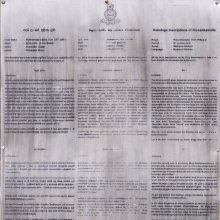Papishtha, Pāpiṣṭha: 12 definitions
Introduction:
Papishtha means something in Hinduism, Sanskrit, Marathi, Hindi. If you want to know the exact meaning, history, etymology or English translation of this term then check out the descriptions on this page. Add your comment or reference to a book if you want to contribute to this summary article.
The Sanskrit term Pāpiṣṭha can be transliterated into English as Papistha or Papishtha, using the IAST transliteration scheme (?).
Alternative spellings of this word include Papishth.
Images (photo gallery)
In Hinduism
Purana and Itihasa (epic history)
Source: archive.org: Shiva Purana - English TranslationPāpiṣṭha (पापिष्ठ) refers to a “sinful person”, according to the Śivapurāṇa 2.3.35 (“The story of Padmā and Pippalāda”).—Accordingly, as Dharma said to Padmā (wife of sage Pippalāda) (in the guise of a king): “Away, away, go away you sinful (pāpiṣṭha) king. If you cast your lustful ogles at me you will be doomed in a trice. How can I resort to you, lecherous and mad after women, after forsaking the excellent sage Pippalāda whose body is sanctified by austerities? By the very touch of a person under the influence of women all merits are destroyed. He is a great sinner. His very sight promotes sins. [...]”.

The Purana (पुराण, purāṇas) refers to Sanskrit literature preserving ancient India’s vast cultural history, including historical legends, religious ceremonies, various arts and sciences. The eighteen mahapuranas total over 400,000 shlokas (metrical couplets) and date to at least several centuries BCE.
Languages of India and abroad
Marathi-English dictionary
Source: DDSA: The Aryabhusan school dictionary, Marathi-Englishpāpiṣṭha (पापिष्ठ).—a pāpī a Sinful, vicious.
Marathi is an Indo-European language having over 70 million native speakers people in (predominantly) Maharashtra India. Marathi, like many other Indo-Aryan languages, evolved from early forms of Prakrit, which itself is a subset of Sanskrit, one of the most ancient languages of the world.
Sanskrit dictionary
Source: DDSA: The practical Sanskrit-English dictionaryPāpiṣṭha (पापिष्ठ).—a. Most sinful, worst, very wicked (superl. of pāpa q. v.).
Source: Cologne Digital Sanskrit Dictionaries: Shabda-Sagara Sanskrit-English DictionaryPāpiṣṭha (पापिष्ठ).—mfn. (-ṣṭhaḥ-ṣṭhā-ṣṭha) Very wicked. E. pāpa, and iṣṭhan aff.
Source: Cologne Digital Sanskrit Dictionaries: Cappeller Sanskrit-English DictionaryPāpiṣṭha (पापिष्ठ).—(super. to pāpa) worst, lowest, most wicked; [comparative] tara† worst off, [superlative] tama† worse than ([ablative]). —[masculine] a bad man, villain.
Source: Cologne Digital Sanskrit Dictionaries: Monier-Williams Sanskrit-English DictionaryPāpiṣṭha (पापिष्ठ):—[from pāpa] mfn. worst, lowest, most wicked or bad, [Atharva-veda]; etc.
Source: Cologne Digital Sanskrit Dictionaries: Yates Sanskrit-English DictionaryPāpiṣṭha (पापिष्ठ):—[(ṣṭhaḥ-ṣṭhā-ṣṭhaṃ) a.] Very wicked.
Source: DDSA: Paia-sadda-mahannavo; a comprehensive Prakrit Hindi dictionary (S)Pāpiṣṭha (पापिष्ठ) in the Sanskrit language is related to the Prakrit word: Pāviṭṭha.
[Sanskrit to German]
Sanskrit, also spelled संस्कृतम् (saṃskṛtam), is an ancient language of India commonly seen as the grandmother of the Indo-European language family (even English!). Closely allied with Prakrit and Pali, Sanskrit is more exhaustive in both grammar and terms and has the most extensive collection of literature in the world, greatly surpassing its sister-languages Greek and Latin.
Hindi dictionary
Source: DDSA: A practical Hindi-English dictionaryPāpiṣṭha (पापिष्ठ) [Also spelled papishth]:—(a) sinning, committing sinful acts; (nm) a sinner; great sinner.
...
Kannada-English dictionary
Source: Alar: Kannada-English corpusPāpiṣṭha (ಪಾಪಿಷ್ಠ):—[noun] an unjust, wicked, depraved or sinful woman.
Kannada is a Dravidian language (as opposed to the Indo-European language family) mainly spoken in the southwestern region of India.
See also (Relevant definitions)
Starts with: Papishthatama, Papishthatara.
Ends with: Kadupapishtha.
Full-text: Papishthatama, Sharavani, Papishthatara, Papishth, Pavittha, Papa, Kusha.
Relevant text
Search found 4 books and stories containing Papishtha, Pāpiṣṭha, Papistha, Paapishtha; (plurals include: Papishthas, Pāpiṣṭhas, Papisthas, Paapishthas). You can also click to the full overview containing English textual excerpts. Below are direct links for the most relevant articles:
Bhajana-Rahasya (by Srila Bhaktivinoda Thakura Mahasaya)
Text 14 < [Chapter 3 - Tṛtīya-yāma-sādhana (Pūrvāhna-kālīya-bhajana–niṣṭhā-bhajana)]
Chaitanya Bhagavata (by Bhumipati Dāsa)
Verse 1.7.97 < [Chapter 7 - Śrī Viśvarūpa Takes Sannyāsa]
Verse 1.1.123 < [Chapter 1 - Summary of Lord Gaura’s Pastimes]
Verse 3.4.362 < [Chapter 4 - Descriptions of Śrī Acyutānanda’s Pastimes and the Worship of Śrī Mādhavendra]
Shri Gaudiya Kanthahara (by Srila Bhaktisiddhanta Sarasvati)
Lord Hayagriva in Sanskrit Literature (by Anindita Adhikari)
